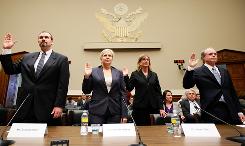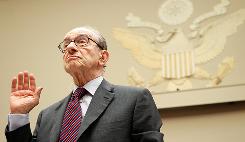|
|
||||||||||||||||||||||||||||||||||||||
By David J. Lynch, USA TODAY
WASHINGTON — He's human after all.
From the councils of government to the paneled boardrooms of Wall Street, the idea of Alan Greenspan erring once would have seemed rank heresy. Those days, however, are long gone. Pressed Wednesday to defend his stewardship of the U.S. economy in the years before a massive housing bubble collapsed, the former Fed chairman told a commission investigating the origins of the financial crisis: "In the business I was in, I was right 70% of the time, but I was wrong 30% of the time." The former Federal Reserve chairman probably didn't mean it this way, but that score — depending upon your point of view — is worth either a C- or a seat alongside an economic thinker who is almost no one's idea of a sage. That 70/30 formula, after all, is precisely the grade the Chinese Communist Party has always applied to Chairman Mao Zedong's tumultuous rule. Greenspan's self-assessment came in testimony before the bipartisan Financial Crisis Inquiry Commission, which began three days of hearings on the role of subprime lending in the housing bubble and subsequent financial collapse — which the star witness called the "most virulent global financial crisis ever."
TESTIMONY: Read all the participants prepared remarls
MEANWHILE: SEC tries to defuse asset-backed securities
The former central bank chief kicked off the session by arguing that the Fed was not to blame for the financial crisis that is now in its third year. The Fed's decision to hold short-term rates at unusually low levels in the early years of this decade had no effect on mortgage rates, which were driven instead by a global surplus of savings, he said. And, he said, any aggressive Fed move to restrict so-called subprime lending would have been quashed by Congress, which saw such loans to individuals with poor credit histories as an important tool in boosting homeownership rates. "We did do almost all of the things that you're raising and the consequence of that is I think things were better than they would have been," Greenspan said. Commission member Brooksley Born, however, blistered Greenspan with a catalog of what she described as the Fed's failures: "The Fed utterly failed to prevent the financial crisis. The Fed and the banking regulators failed to prevent the housing bubble. They failed to prevent the predatory-lending scandal. They failed to prevent our biggest banks and bank holding companies from engaging in activities that would bring them to the verge of collapse without massive taxpayer bailouts. They failed to recognize the systemic risk posed by an unregulated over-the-counter derivatives market, and they permitted the financial system and the economy to reach the brink of disaster. You also failed to prevent many of our banks from consolidating and growing into gigantic institutions that are now too big and-or too interconnected to fail." Born, the former head of the Commodity Futures Trading Commission, clashed with Greenspan in the late 1990s over her desire to regulate derivatives like those that later blew massive holes in bank balance sheets. What caused the crisis? Congress established the commission to determine what caused the global financial crisis. The panel held its first public hearing in January and is due to report its findings by Dec. 15. It has subpoena power, but so far all witnesses have volunteered to appear under oath. For Greenspan, Wednesday's testimony before the 10-member panel bore little relation to his Capitol Hill appearances while at the Fed helm from 1987 to 2006. During the long economic boom known as "the Great Moderation," lawmakers fawned over him and investors hung on his every word. Journalist Bob Woodward chronicled his exploits in a book entitled Maestro.
GREENSPAN: Read the former Fed chief's testimonry
But in the wake of Washington's unpopular bank bailout, the loss of 8 million jobs and ruined public finances, Phil Angelides, the panel's chairman and a former Democratic gubernatorial candidate in California, peppered Greenspan with charges that the Fed had slept while the economy headed toward a cliff. Angelides listed a series of warnings from housing and Treasury officials, the FBI and even another Federal Reserve board member before asking: "Why, in the face of all that, did you not act to contain abusive, deceptive subprime lending? Why did you allow it to become such an infection in the marketplace?" Later, Angelides tartly summarized an exchange over the Fed's reluctance to act in a related area, saying, "My view is you could have, you should have and you didn't." But Greenspan, 84, hit back, blaming the government-backed Fannie Mae and Freddie Mac for distorting the market for subprime loans. Until about 2003, subprime lending worked well, according to Greenspan. Around 70% of the loans were made at fixed rates to individuals who could afford the monthly payments but lacked the upfront deposit required for regular mortgages. From then on, he said, Fannie and Freddie piled into the subprime market to meet congressional pressure from both parties aimed at boosting homeownership among low-income groups. That drove mortgage yields down and encouraged the growth of the housing bubble, Greenspan said. Demand from the government-backed entities and foreign investors was met by large U.S. banks, who packaged the loans into securities. He also said regulators almost certainly will be unable to prevent future financial crises, so the focus should be on structuring the financial industry so that it can better absorb unexpected blows. Echoing a recommendation he made in a 48-page paper for a recent Brookings Institution address, Greenspan said banks should be required to hold significantly more capital in reserve. Though he did not specify a figure to the commission, he recommended in the Brookings paper increasing the capital required from the current 11% of assets to 14%. But Angelides cited a 2005 review of the New York Federal Reserve Bank's oversight of Citigroup to show that the Fed's monitoring of the nation's giant banks historically has been weak. "The supervision program for Citigroup has been less than effective, although the dedicated supervisory team is well qualified and generally has sound knowledge of the organization. There have been significant weaknesses in the execution of the supervisory program," concluded the other regional Fed banks. Controversy remains Greenspan's disavowal of responsibility for the housing bubble also remains controversial. Shortly after he finished testifying, Thomas Hoenig, president of the Federal Reserve Bank of Kansas City, flatly contradicted the former Fed boss on the role low interest rates played. "Exceptionally low rates, while perhaps not the single cause, played an important role in creating the conditions leading to our recent crisis," Hoenig said in Sante Fe. "... I am confident that holding rates down at artificially low levels over extended periods encourages bubbles, because it encourages debt over equity and consumption over savings." The panel also heard from Richard Bowen, a former Citigroup head underwriter, who said he warned his superiors repeatedly about the deteriorating quality of mortgages the bank was buying and then packaging as securities for sale to institutional investors. Bowen's efforts included a Nov. 3, 2007, e-mail to top Citigroup officials, including Robert Rubin, chairman of the bank board's executive committee, warning of "breakdowns of internal controls and resulting significant but possibly unrecognized financial losses existing within our organization." Rubin, who was President Clinton's Treasury secretary, is scheduled to appear before the commission Monday, along with former Citigroup CEO Charles Prince. "The issues raised by Mr. Bowen were promptly and carefully reviewed when he raised them, and corrective actions were taken," said Molly Millerwise Meiners, a Citigroup spokeswoman. Bowen testified that he received a telephone call from one of Citi's general counsels three days after his e-mail, informing him that higher-ups "took it seriously." In January, he spent five hours on a series of conference calls with the attorney and other executives. But he does not know what actions resulted. Bowen left Citi's payroll on Jan. 23, 2009. Thomas Maheras, former co-CEO of Citi's markets and banking unit, said the bank's executives were focused on potential risks involved in subprime mortgages. Citi's economic model in 2007 assumed that housing prices would continue to decline. But executives failed to identify the danger that housing prices could fall as sharply as they have since their 2005 peak. "We in the industry and the regulators missed this particular aspect of risk management," he said. Added David Bushnell, the bank's former chief risk officer, "Thinking of things that have never happened before is important."
Guidelines: You share in the USA TODAY community, so please keep your comments smart and civil. Don't attack other readers personally, and keep your language decent. Use the "Report Abuse" button to make a difference. Read more.
|
||||||||||||||||||||||||||||||||||||||
|
| ||||||||||||||||||||||||||||||||||||||




